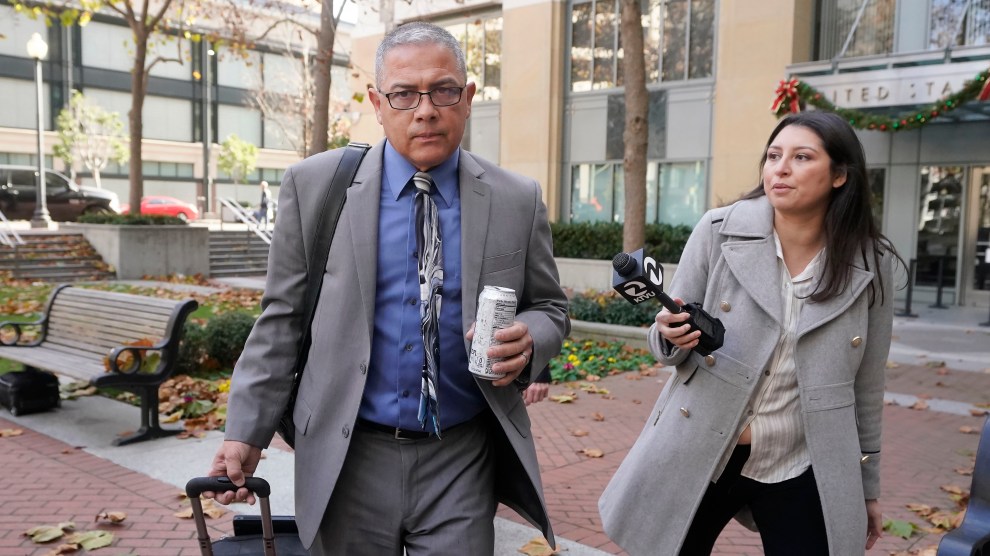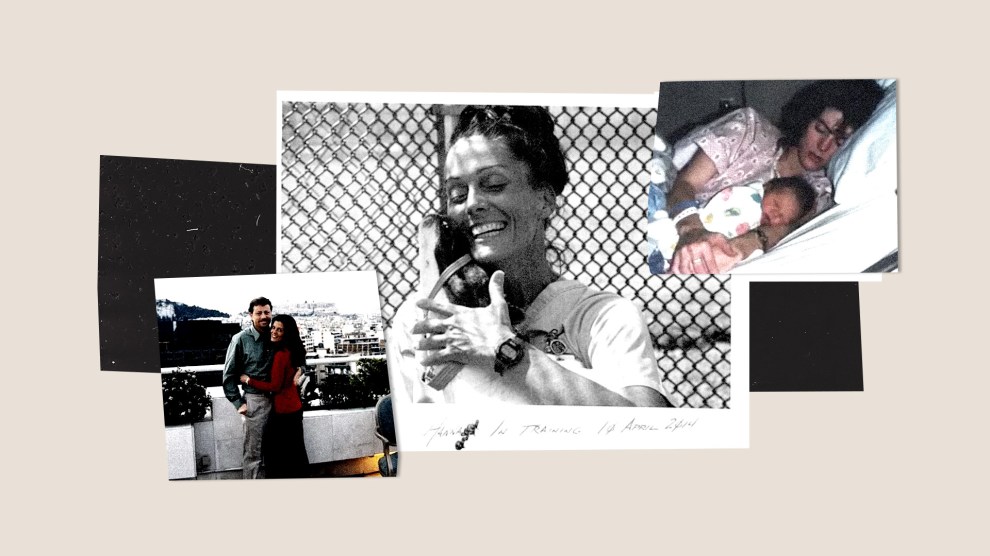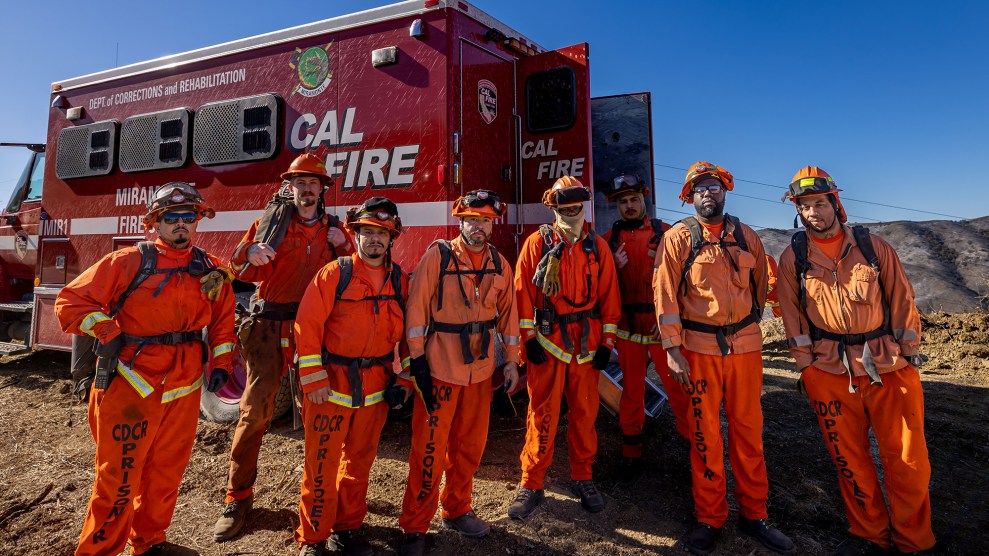
Ray Garcia, the former warden of FCI Dublin prison, leaves the federal courthouse in Oakland, California, on November 28. Jeff Chiu/AP
Update, December 8: A jury has convicted Ray Garcia, the former warden of the federal women’s prison in Dublin, California, on all eight counts of sexual abuse and lying to the FBI. “His hubris and his arrogance were so great,” jury foreman Simeon Meyer told KTVU, adding that she hopes the guilty verdict “sends a message” to other correctional officers. The first three counts carry a maximum prison sentence of 15 years each, while the subsequent counts carry shorter maximum sentences. His sentencing hearing is set for March.
At the federal courthouse in Oakland, California, last week, an incarcerated woman named Katrina sat in the witness stand, avoiding the gaze of her former warden. The prosecutor asked her to begin by describing the comments the warden, Ray Garcia, made about her breasts after they first met in 2020 on the walkway from her cell to the cafeteria. “Can I have a minute?” she asked the attorney, her voice shaky with emotion.
After a pause she began to speak, her words so soft that it was at times difficult to hear: He said “he would like to see them, to see me topless, to see me nude during rounds.” In the weeks after their first encounter, she added, Garcia repeatedly instructed her to return to her cell and strip for him, and to apply lotion to her skin while he came through the housing unit. It was “humiliating,” she told the jury.
Katrina, whose last name was withheld in court for privacy reasons, is one of several women who are or were incarcerated at the federal prison in Dublin, California, who have accused Garcia of abusing them from 2019 to 2021. They say he showed them photos of his penis, groped them, forced them to strip, and digitally penetrated one of their vaginas. Garcia is among five correctional officers at FCI Dublin to face sex abuse charges in the last couple of years, amid widespread accusations of staff misconduct there. The accusations are so persistent that prisoners and officers now reportedly refer to the facility as “the rape club.”
But Garcia’s case stands out: He’s the highest-ranking federal prison official to be arrested in over a decade, and his prosecution is an exceedingly rare example in which incarcerated women—who normally have little recourse after abuse—have made it all the way to court. The trial has not only allowed them to air their grievances in an official proceeding; it might also condemn their former warden, once the most powerful man at the prison, to years behind bars himself.
“The abuse itself is not what’s exceptional; it’s that anybody is doing anything about it, that anybody is paying attention to it,” says Susan Beaty, an attorney in Oakland. She says dozens of women at Dublin have told her they survived sexual misconduct, and many of them struggled to get investigators to take them seriously: As of February, the Bureau of Prisons had substantiated only 4 out of 422 complaints nationwide of staff-on-prisoner sexual abuse in federal correctional facilities in 2020, according to an Associated Press investigation.
As Katrina testified last week, Garcia, 55, watched her from the defense table, quietly passing notes to his attorney and occasionally shaking his head. He has denied the allegations against him, even after the FBI found sexually explicit photos on his personal and work cellphones and computers, including an image of another nude incarcerated woman on her hands and knees inside a cell at Dublin, with his own face reflected in the window. (Garcia claims he walked in on her during a drug search.) He did not respond to a request for comment about allegations of abuse.
As warden, Garcia could send women to solitary confinement or deny them compassionate release, a form of early release from prison for medical problems or other qualifying events. He also played a big role in abuse investigations, receiving a notification whenever someone accused staff of misconduct. And he seemed to have little fear of accountability, according to the women who testified. They said Garcia knew where the surveillance cameras were and intentionally brought women to areas with blind spots, limiting future video evidence against him.
At one point, Katrina told the jury, he even accosted her in the middle of a tour he was leading with accreditors who were visiting the prison to ensure it complied with the Prison Rape Elimination Act. While the inspectors stood in the same room, she said, he quietly told her he was disappointed that she hadn’t been naked in her cell earlier that morning, like he’d instructed her to be.
Two days later, he allegedly requested she strip again, and she did as she was told. The warden and assistant wardens “have control over everything,” she told the jury. “They can make life living hell.”
The trial, attended by journalists from several outlets, offered the women a rare chance to share their stories with the broader public.
One of the most disturbing testimonies came from Melissa, the woman whom Garcia appeared to have photographed nude in a cell. Melissa met Garcia in 2018, a few years into her sentence, after he was hired as an assistant warden. At the time, Melissa worked as an orderly in the visitation room, cleaning the area before and after family visits. Garcia was often there, giving her attention. “He would ask me how my son was and if there was anything that I needed,” she told the jury. “He would tell me that he was there to make my time easier,” she said, “and that he was always, you know, going to protect me and make sure nothing happened to me.”
After her mother passed away in 2019, Melissa’s relationship with Garcia allegedly escalated. One day, she testified, he brought her into a bathroom and told her there were no cameras in there, and then began to kiss her. “He pulled my pants—like jerked me toward him, and he stuck his finger down my pants and he stuck his finger inside of, in my vagina,” she told the jury. “I was in shock…but I felt like he loved me and he cared about me, you know, and I wanted to make him happy.”
Garcia used his power “to manipulate” Melissa, federal prosecutor Andrew Jay Paulson told the court, alleging that the former warden showed a similar pattern with other incarcerated women: He flattered them and then came onto them, often showing them photos of his penis. Then he “did things only a warden could do, made promises about transfers to lower security camps, made promises about granting compassionate release,” Paulson alleged. “Then things because physical.”
In December 2019, Garcia took the photo of Melissa naked on her hands and knees. “He said, ‘Don’t move,’” she testified, “and he took pictures of me.” He allegedly gave her a half-eaten candy cane and instructed her to place it inside her vagina, which she said burned her and embarrassed her. Later that afternoon when she saw him in the rec area, he allegedly had the same candy cane in his mouth and said, “You taste really good.”
Melissa testified that Garcia told her she could get in trouble if anyone found out about their relationship, and that he was close friends with the person at the prison who conducted investigations into sexual abuse allegations.
“But despite his best efforts, he couldn’t keep this under wraps forever,” Paulson told the court. Melissa alerted her lawyers, and in July 2021 the FBI executed multiple search warrants against Garcia. Agents discovered large quantities of candy in his car, corroborating allegations that he gave women sweets after they performed sexual acts.
The FBI also found hundreds of sexually explicit photos on his work and personal cellphones and computers, including dozens of him and a formerly incarcerated woman named Rachel having video-sex in the weeks after her release from the facility, in violation of federal prison policy. Some of the photos of his penis appeared to have been taken in the warden’s bathroom, just a few feet from his office.
When Garcia took the stand last week, he appeared nervous, speaking so quickly that the court reporter often struggled to transcribe his testimony. Garcia acknowledged that he had video-sex with Rachel after her release, shortly before he was promoted to warden. “I was an idiot for my actions,” he said. “It was inappropriate and against bureau policy.”
But he denied all allegations of abuse inside the prison. During an interview with the FBI in 2021, he said incarcerated women would sometimes try to be sexual during his rounds, but he would ignore them. His attorney emphasized that in the hundreds of photos found on his devices, only two showed him with Melissa, and none showed him with any other women inside the prison.
And those photos of Melissa weren’t what prosecutors believed them to be, Garcia told the jury. The former warden claimed he was conducting rounds when he saw a window covered on a cell door, and he worried someone inside was packaging drugs. So he swung the door open and took an immediate picture, to capture evidence before the prisoner could flush it down a toilet. But there were no drugs, he said—just Melissa, nude on all fours. He said he took a second photo of her when she stood up to capture her face, so he could submit an incident report accusing her of misconduct for removing her clothes in a cell that did not belong to her. “I took the picture, froze for a quick second, and then began yelling at the inmate to get dressed,” he told the jury. He said he brought the camera home to crop out the image of his reflection in the window, because he did not want himself included in her personal file. He did not crop the photos at work, he added, because he would have needed to install a new app on his computer there to do so.
During a tense cross-examination, federal prosecutors attempted to poke holes in his story: Garcia never filed an incident report against Melissa—he said he typed one up at home, didn’t save it, and then shredded it. Nor did he tell anyone else on staff about the encounter or the photos. He says he agreed to stay silent because Melissa offered to be an informant for him, but he never documented her as an informant, which was another violation of federal prison policy.
Federal prosecutors also pointed out that Melissa smiled for the camera, without the surprised expression that might be expected had Garcia busted into the room. “You took that picture because it aroused you, didn’t you?” one prosecutor asked. Garcia’s voice rose: “No it did not,” he said. “I have plenty of pictures that I can use for arousal with free women that I could see any day of the week. I do not need a picture of an inmate to arouse me.”
Garcia and his attorney implied that his accusers were not reliable witnesses. When asked how the women would have learned that he had photos of his penis on his phone had he not shown them the images, Garcia gave a convoluted answer that Melissa often watched him closely in a manner that could be described as “stalking,” and that she may have seen the photos on his phone and spread rumors.
Melissa and the other women, his attorney James Reilly seemed to suggest, had a history of wrongdoing. “The evidence is…going to show that Melissa is a convicted felon, that Maria is a convicted felon, that Rachel is a convicted felon, and that the other witnesses who are going to testify who were inmates at the time obviously are all convicted felons,” Reilly said during opening statements. He did not elaborate, but the implication was clear—who are you going to trust?
Many of the women at FCI Dublin understood that if they came forward, they might not be believed. Some witnesses initially did not want to talk to the FBI, including Rachel. When investigators got information about another woman’s relationship with Garcia, she initially denied it.
Similar problems exist in state prisons, as my colleague Madison Pauly recently reported. In New York, hundreds of formerly incarcerated women never pressed charges or sued people who sexually assaulted them until long after they left prison, when the governor signed a law in May that gives New Yorkers a one-year window to bring their sexual abusers to court, even if the statute of limitations expired. “I suppressed it,” Jacqueline Wiggins, now a nurse, told the New York Times of her allegations that a guard raped her in the 1990s. “I kept it down in my gut. I didn’t think I was worthy. I didn’t think anyone would care.”
Nationally, more incarcerated women have alleged prison rapes since Congress passed the federal Prison Rape Elimination Act, which led the Justice Department in 2012 to require that detention facilities give incarcerated people multiple ways to report sexual abuse. The law also requires correctional officials to investigate every accusation. By 2015, reports of prison sexual assault and harassment jumped significantly—to 24,661 across the country, compared with 8,768 in 2011.
But as abuse reports skyrocketed, survivors were unlikely to see justice: Of the 61,316 completed investigations from 2012 through 2015, corrections officials substantiated only about 8.5 percent, while the remaining were either deemed false or lacked enough evidence. Incarcerated people likely weren’t lying about their experiences, Lovisa Stannow, who leads the advocacy group Just Detention International, told the Marshall Project. “Prisoners have nothing to gain from filing false sex abuse reports,” she said. But correctional officials often assume that allegations are false, she said, especially when a colleague is implicated: “There’s a very strong tendency to close ranks.”
At FCI Dublin, correctional officers who spoke out against their coworkers over the years say they faced retaliation. Tess Korth, a supervising officer there, was transferred to a men’s prison in Oregon after she reported abuse, including by a former prison chaplain who later pleaded guilty to having sex with an incarcerated woman. Korth retired in July and attended days of Garcia’s trial, telling local reporters for KTVU that her former boss’s denials of wrongdoing were “bullshit.” “Does he think we’re stupid?” she said incredulously. “His explanation is unbelievable.”
Under the Prison Rape Elimination Act, women at Dublin technically have multiple ways to report abuse, in that they can file complaints with any staff member. But federal prosecutors said women lacked a clear process for reporting allegations against a warden, given that he was always notified when they filed any complaints. In September, Bureau of Prisons Director Colette Peters, who oversees federal prisons nationally, told the Senate that the allegations at Dublin prompted her to make some reforms, including hiring more investigators and redirecting sexual accusations straight to her team in DC.
Beaty, the lawyer in Oakland, says some of her clients don’t want investigations to stay within the BOP—they want community reporting options, with an outside agency or nonprofit taking their complaints. “By design, prisons are so detached from the rest of society, from the communities they’re embedded in,” she told me, “and that isolation feeds abuse.”
Under the current system, women at Dublin face consequences for whistleblowing. One prisoner named Michelle was put in solitary confinement for 11 months after alleging sexual misconduct by staffers, according to prosecutors at Garcia’s trial. “There are…multiple repercussions from me being here today,” Katrina, the woman who testified about stripping in her cell, told the jury. Since coming forward, she testified, a correctional officer has regularly raided her cell, dumping her oatmeal and honey onto the floor. Another staffer allegedly asked her to take her clothes off and fondle herself during his rounds, like she did for Garcia. “You did it for him, so you can do it for me,” she recalled the staffer saying.
On Tuesday afternoon, the jury began deliberating. If convicted, Garcia could face 15 years in prison for three counts of sexual abuse of a ward, while the subsequent charges of abusive sexual contact and lying to a government agency carry a lesser sentence. Three of his former Dublin colleagues have already pleaded guilty to sexual abuse, while a fourth is awaiting trial.
But even if these prosecutions are a first step at justice, says Beaty, sending a handful of former officials to prison won’t fix the widespread culture of misogyny at women’s correctional facilities. “What he did, what the many other staff at Dublin did to abuse people, only could have happened because of deep systemic problems,” she says. “I haven’t talked to anyone who thinks this trial or this prosecution is going to address the rot that allowed him to act the way he did for years with impunity.”
The women who testified against Garcia, at the end of the day, were forced to return to that rot. Some of them are now applying for compassionate release, arguing that they should be freed early because of the trauma they experienced in the government’s custody. But approval for such requests is relatively rare. There’s no guaranteed “reward for coming to court today,” Katrina told the jury, adding that she was dreading heading back to Dublin and worried about the repercussions that might await her there. Not long afterward, she finished her testimony and was escorted down from the witness stand and past Garcia’s defense table, then out of the room and back to prison to wait for a verdict.

















